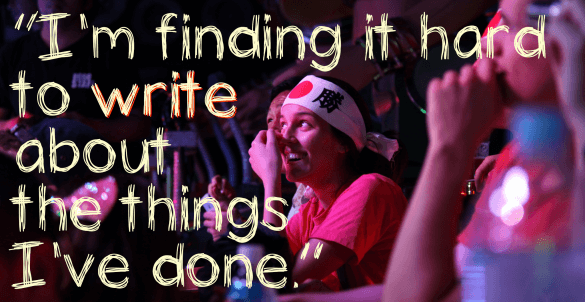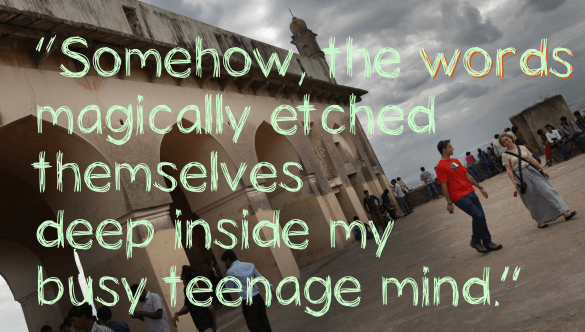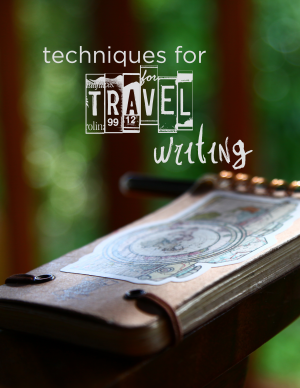1) Hi Nada, can you tell us what you've been up to since graduating from THINK Global School in 2022? Since graduating in 2022, I've been pursuing a passion I found while at TGS, sustainability, and I am currently majoring in engineering in renewable energy systems at Al Akhawayn University, in Ifrane, Morocco. But there is way more than that! I've had a chance also to explore the world of...
Read MoreI couldn’t possibly tell every story at TGS; not only would the sheer number be insurmountable, but those stories shouldn’t all come from my perspective. All I can do is watch, ask, and imagine how people experience the moments we share together.
My first international trip was to Italy when I was 16. I lived in a convent and explored a hill town in Umbria, expressing my thoughts daily through drawing, color slide photography, piano, and the Italian language.

I remember having a seemingly unhealthy fascination with three little trash cans outside my summer school. It came with a little retrospection and discussion that this was my way of connecting with this foreign land – through finding the mundane realities of life I knew we shared, like the throwing away of trash at the end of a day.
Some of our students are only 14 year-olds and some are only experiencing their second country ever. I often wonder if they feel they have a way to better understand this nomadic life they lead.
Do they feel confused by the differences they witness in the world?
Do they know they can rely on a particular language of expression to get out their thoughts?
Do they realize the value of introspection and the communication of these thoughts, regardless of how vague or inconclusive they might seem?
These stories about travel, the ones that symbolize micro-shifts in worldview and understanding, are the ones I’m most interested in at THINK Global School. They are the ones I want our students to share with the world.
Can teenagers travel write?
At the end of our term in Hiroshima, I asked my Level 2 newMedia Lab students if there was anything they felt they hadn’t learned yet in the world of technology and communication that they felt was essential to their TGS experience. One student said:

After dedicating weeks of class time over the years to travel writing (and after personally spending many post-trip hours in tear-filled confusion, desperately trying and failing to communicate my evolving thoughts with my community), this statement was a blow to my heart.

While the newMedia Lab isn’t meant to turn every TGS student into a National Geographic-quality travel writer, it aims to provide all the students the time and space to communicate that which they need to express, whether it be knowledge for their classes or thoughts from any aspect of their lives.
At the very least, I hope they feel equipped toapproach writing or photography or video-making in order to process the incredible opportunities they get.
I looked at the Level 2 student in the back of the room and said:
Would it help if I wrote down a bunch of techniques to approach travel writing, ones that help you avoid sounding cliché or choose stories amongst a sea of experiences?
I saw little happy, hungry eyeballs staring back at me.
Techniques for Travel Writing
Over the summer, I drafted a travel writing handbook — something I hoped that the students could use as a reference when the storytelling juices simply weren’t flowing.
I asked colleagues and travel writers for feedback, and the handbook got a tepid reception. One reviewer explained to me her reason why:
Do teenagers independently marvel at the world, or do we need to tell them when and where? Do they feel the need to share information with communities back home? I rather think that travel writing is an adult venture. [One] needs a level of maturity to document [their] travels in a more meaningful way.
It’s an interesting reality to consider: is it realistic to assume all teenagers can reflect on their travels with maturity and wrangle written words to perfectly describe their shifting perspectives? Is it like casting molds of massive tectonic plates in motion?
Talking travel wisdom with teens
Upon the return to school the next academic term, I spelled out the whole situation to my students. I let them know they were going to play an integral role in the evolution of how we treat this writing genre at THINK Global School. We started discussing the following questions in small groups:
The bullet points below each represent some of the thoughts each group had regarding that question.
What are some of your hardest emotional challenges that you have faced that are a result of travel?
- home-sickness/friend-sickness
- trying to find alone time
- wanderlust
- stress
- friendships and maintaining connections
- the knowledge that we will never live with our parents again
- identity stripped away from you and not being able to relate with people the way you used to
- where is home?
- the unknown becomes the only thing you are sure about and change comforts you
- being an ambassador for your entire person
What’s it like to talk to people about your travels?
- empty questions
- is what you’re saying actually true?
- high expectations
- telling isn’t the same as being there
- by telling, do we include them?
- we tell them what they want to hear
- under pressure because you feel you can’t portray the experience adequately
- judgment from others
How has the concept of travel changed for you during your time here at TGS?
- gained more meaning / understanding more
- I learn to be more independent.
- MORE.
- taken advantage of before
- love for people
- seizing the moment
- the value people place on travel
These students were open and honest about a layer of this high school experience that affects everything, but that they don’t feel fully equipped to handle. They expressed a vested interest in building their writing skills because they feel their friendships, identities, and memories are at stake without them.
Grooming the next Thoreaux
These students show their age when they talk about life plans (or lack thereof), relationship woes, and musical tastes, but when it comes to the topic of travel, they spout wisdom like Confucius. Of all topics, I believe our budding global citizens are ready to dive into this one and produce far-reaching, articulate works.
We have students who have spoken personally with heads of state, worked in rural villages in India, climbed mountains in Africa, and felt Boston shudder during the Marathon bombings. To not be able to explain these life-altering experiences is to risk missing their impact entirely.
The handbook was a small experiment to encourage what can now be seen as a bigger shift in TGS culture, a growing emphasis on travel writing that is visible on their personal portfolios and sometimes syndicated on platforms such as Huffington Post Travel.

It appears the more students we graduate, the more examples we have of people recording and using these life experiences to affect meaningful change in their lives and the lives of others. Our younger students are picking up on the value of these records and the process of reflecting on their travels.
Give the handbook a try for free!
As we often question in newMedia Lab, where does travel start and stop? I don’t believe travel writing is only for those enrolled in a globe-trotting school but anyone who wants to approach their life with a sense of discovery and an urge to write about it.
Techniques of Travel Writing is open and available for anyone to download and use for educational purposes, and I would greatly appreciate any feedback on its content and format. Hopefully, what results from more minds coming together is a resource that can help teens anywhere better process their world experiences and become a voice for change.
